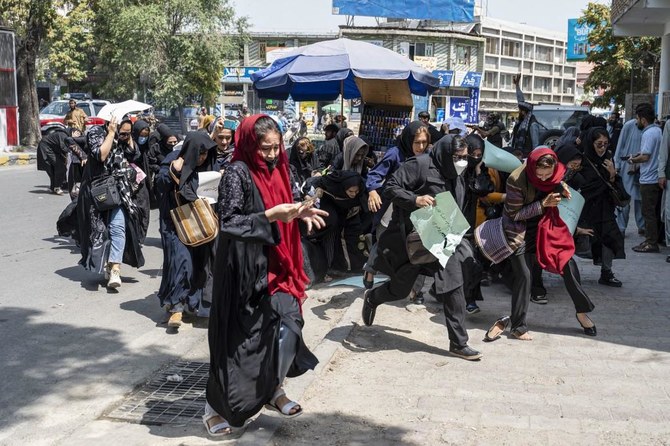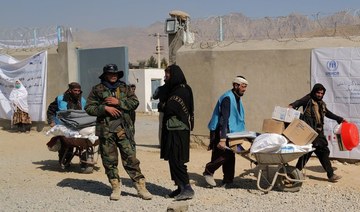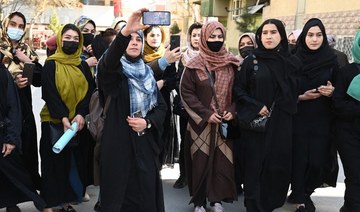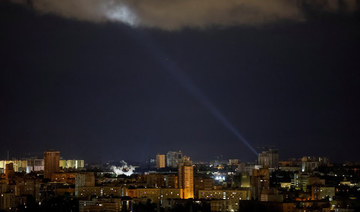KABUL: The Taliban government said on Wednesday that forbidding Afghan women from working for the UN is an “internal issue” and will not create obstacles to the global organization’s operations in Afghanistan.
The statement comes a day after the UN launched a review of its work in the country and told about 3,000 of its Afghan staff, both men and women, to stay at home.
According to the UN, the Taliban ban is forcing it to make an “appalling choice” about whether it can continue its mission in Afghanistan.
In the Taliban’s first full statement since the UN acknowledged receiving the order last week, chief spokesman Zabihullah Mujahid said on Wednesday that the government is “committed to all the rights of our people.”
“The Islamic Emirate does not want to create obstacles for the United Nations; rather, it wants to make it clear that this is an internal issue of Afghanistan, which does not create problem for anyone and should be respected by all sides,” Mujahid said.
“This decision does not mean that there is discrimination, or creates obstacles to the functions of the United Nations.”
Mujahid said the humanitarian crisis in Afghanistan is the result of sanctions and pressure from the international community, including travel bans, restrictions on its banking sector and the freezing of Afghan central bank assets.
The ban on Afghan women working for the UN was the latest in a series of curbs imposed on women since the Taliban took over the country in 2021.
The ruling administration has banned education for girls and women beyond the sixth grade, while women are also barred from working, studying, or traveling without a male companion. In December, the Taliban also placed a ban on most female NGO workers.
The UN has said it cannot accept the decision, calling it unlawful and an unparalleled violation of women’s rights.
Both Afghan women and men are essential to all aspects of UN work in Afghanistan, including delivery of life-saving aid to millions of people, the global body said.
“People have lost their hope in Afghanistan,” Farimah Nikkhwa, an Afghan women’s rights activist, told Arab News.
The situation is “really worrying,” she said, adding that those protesting or raising awareness in the country have either been arrested or tortured.
Nikkhwa said she is concerned that human rights organizations and the UN are not taking enough action against the Taliban.
“The Taliban are hard-liners and I hope their rule is not sustained in Afghanistan. Women in Afghanistan do not even have the most basic rights; the situation is really frustrating and unbearable.”
However, Arzo Joya, a former NGO worker, said she is still holding on to hope despite everything that has happened in her country.
“I hope the Taliban revise such decision and give permission to women to work and resume education, as well to see a developed and advanced Afghanistan in the future,” she said.
Taliban say ban on women staff is no obstacle to UN work in Afghanistan
https://arab.news/2bx4h
Taliban say ban on women staff is no obstacle to UN work in Afghanistan

- Decision ‘should be respected by all sides,’ Taliban govt says
- UN calls Taliban order an unparalleled violation of women’s rights
Germany urged to explain Schengen ban on British Palestinian academic

- Dr. Ghassan Abu-Sittah, who has been volunteering in Gaza hospitals, was blocked entry to Germany and France in recent weeks
LONDON: A human rights group has urged Germany’s government to publicly announce if it has imposed a Schengen-wide entry ban on a British Palestinian surgeon and academic.
Dr. Ghassan Abu-Sittah, who has been volunteering in Gaza hospitals, was blocked entry to Germany and France in recent weeks and, on Thursday, Dutch officials told Palestine’s ambassador to the Netherlands he would not be allowed to enter the country for an event at the Palestinian Embassy in The Hague on May 15.
When blocked from entering France last Saturday, Abu-Sittah was placed in a holding zone at Charles de Gaulle airport before being expelled, according to French Sen. Raymonde Poncet Monge, who had invited him to speak at the senate.
Abu-Sittah posted to social media and told Human Rights Watch that French authorities at the airport had informed him he was barred due to a year-long ban imposed by Germany, without his knowledge.
A French official told the Associated Press that the German ban would be applied across the entire 29-country Schengen area.
“Dr. Abu-Sittah has seen firsthand the atrocities taking place in Gaza,” said Yasmine Ahmed, UK director at Human Rights Watch. “Germany should immediately explain why it has denied him entry and imposed this far-reaching ban on a leading health professional to speak in Berlin, Paris and The Hague about what he witnessed in Gaza.”
The prevention of Abu-Sittah from sharing his experience of treating patients in Gaza amid the Israel-Hamas war ravaging the enclave risked “undermining Germany’s commitment to protect and facilitate freedom of expression, and assembly and to nondiscrimination,” HRW said.
HRW also urged the UK and Scottish governments to push Germany into explaining Abu-Sittah’s Schengen-wide visa ban.
“In the midst of ongoing atrocities in Gaza, countries should be prioritizing ending complicity and promoting accountability,” Ahmed said. “Instead, Germany, in blocking Dr. Abu-Sittah from sharing his experience, is trying to block citizens from even hearing about the grave abuses taking place in Gaza. The UK government should immediately raise the reported ban with their German counterparts.”
Iraqi people smuggler who sent thousands across English Channel tracked down by BBC

- A BBC report released on Friday revealed how the organization tracked Majeed down and carried an interview with the fugitive
LONDON: A crime boss wanted in several countries for his role in the smuggling of an estimated 10,000 migrants across the English Channel has been tracked down, according to reports in the British media.
Iraqi Kurd Barzan Kamal Majeed, nicknamed “Scorpion” because of his WhatsApp avatar, had been missing since failing to appear in court in Belgium for a sentencing hearing in November 2022.
The UK’s National Crime Agency issued a warrant for his arrest that same year. Majeed had moved to the British city of Nottingham in 2013, but had been deported two years later.
A BBC report released on Friday revealed how the organization tracked Majeed down and carried an interview with the fugitive.
Rob Lawrie, a former soldier who now works with refugee support agencies, assisted the investigation, which tracked Majeed to his home in the Kurdistan city of Sulaymaniyah, close to the border with Iran.
During the interview, Majeed said he had lost count of the number of people he had helped smuggle and admitted that between 2016 and 2019 he was one of two people running a people-smuggling operation in Belgium and France.
However, he denied being the boss of the operation, adding: “A couple of people, when they get arrested, they say: ‘We’re working for him.’ They want to get less (of a) sentence.”
Majeed’s accomplice, Nzar Jabar Mohamad, was given a 10-year prison sentence at a British court in Oct. 2021 after admitting to attempting to bring 21 migrants into the UK.
He also denied culpability for the death of migrants who attempted the crossing, claiming he was merely a “money man” who “just took the money and booked places.” He added: “I never put anybody in a boat and I never killed anybody. Nobody forced them. They wanted to, they were begging the smugglers: ‘Please, please do this for us.’”
His profits from the operation, with some estimates putting the price of a crossing at £6,000 ($7,514) per person, enabled Majeed to purchase a villa in Marmaris in Turkiye, according to the local police
According to government figures, more than 9,000 migrants have crossed the English Channel in small boats so far this year, a 15-percent rise on the same period in 2022, which was a record-breaking year in which more than 45,700 migrants arrived.
In his interview with the BBC, Majeed claimed that some of his former co-smugglers were still operating today and that a few had even been granted British passports.
“In three days, one guy sent 170 or 180 people from Turkey to Italy, still holding a British passport. I want to go to some other country to do business. I can’t.”
Ann Lukowiak, a public prosecutor in Belgium who was part of the team that worked on convicting Scorpion, told the BBC she still hopes Majeed will be extradited from Iraq to face justice one day.
“It’s important to us to have sent the signal that you can’t do what you want,” she said. “We will eventually take him down.”
Modi critic joins India’s election campaign on bail

- Top court allows Delhi Chief Minister Arvind Kejriwal to leave custody until June 1
- His release is expected to give a boost to India’s opposition alliance in ongoing polls
NEW DELHI: Delhi Chief Minister Arvind Kejriwal joined India’s ongoing general election — boosting the opposition alliance on Saturday — a day after the Supreme Court ordered his temporary release on bail in a controversial graft case.
A fierce critic of Prime Minister Narendra Modi and the leader of the Aam Aadmi Party, Kejriwal was arrested in late March, in connection with corruption allegations related to the excise policy of the Delhi government led by him. He denies the accusations.
On Friday, the top court granted Kejriwal 21-day interim bail to campaign in the seven-phase general vote, which started on April 19. He has to surrender after the last day of voting on June 1.
“I will go around the country in the next 21 days to stop this dictatorship of Modi,” Kejriwal said at a conference in Delhi.
“After June 4, there will be no Modi government. In all states, their seats are going down and they will not get more than 220 to 230 seats.”
The results of the world’s largest election are set to be announced on June 4. The party or coalition that wins at least 272 of the 543 contested seats in the lower house of parliament will form the government.
Seeking a third straight term in office, Modi has been targeting 400 seats for the National Democratic Alliance led by his Hindu nationalist Bharatiya Janata Party, which has been in power since 2014.
He is challenged by an alliance of two dozen opposition parties, the Indian National Developmental Inclusive Alliance, or INDIA, of which Kejriwal’s AAP is a part.
Kejriwal has accused Modi and his BJP of damaging democracy, and abusing power and the constitution.
“The opposition’s morale will get a further boost,” said Satish Kumar Singh, a political analyst in Delhi.
“The release of Kejriwal further reinforces the opposition campaign on the need to save democracy and maintain fairness in the electoral process.”
Kejriwal’s AAP is a challenger to the BJP in Delhi and Punjab, where voting will take place on May 25 and June 1 respectively.
“Kejriwal’s release is a boost to the cadres of the AAP and the opposition alliance at this crucial time when the opposition alliance is challenging the dominance of the BJP in the capital city,” Andalib Akhtar, a New Delhi-based commentator and editor of The Indian Awaz, told Arab News.
“It’s good that the court has taken a decision in favor of democracy and is giving the opposition leader — who was arrested just on the eve of the general elections — an opportunity to be on an equal footing democratically.”
Saudi eye surgeons help 1,000 Sri Lankans regain sight

- KSrelief team consists of doctors from Saudi Arabia and Pakistan
- Untreated cataracts are the most common cause of blindness in Sri Lanka
COLOMBO: A Saudi eye surgeon team is helping 1,000 people in Sri Lanka regain sight with interventions facilitated by the King Salman Humanitarian Aid and Relief Center.
KSrelief’s Saudi Noor Volunteer Program to Combat Blindness started in the city of Kattankudy on Sri Lanka’s eastern coast on May 5 and will run through next week.
“This is a special program to combat blindness among patients who are suffering from a cataract,” M.S.M. Thassim, director general of KSrelief’s local partner, the Association of Muslim Youth of Sailan, told Arab News.
“From the total of 1,000 patients, 500 completed surgery and 500 more (surgeries) will be performed by May 16.”
Cataracts are the most common cause of blindness in Sri Lanka. Surgery to remove them is common, but government programs often require years of waiting. At private clinics, the cheapest lens replacement procedure costs about $300 — too expensive for many patients in poorer parts of the country.
“Cataracts are becoming a problem among the lower-middle class above the age of 40,” Thassim said.
“We perform cataract surgery and also give post-surgery treatment. The patients are from all parts of the island.”
The procedures are free of cost and conducted at the Kattankudy Base Hospital by Sri Lankan medics and six Saudi and Pakistani surgeons from KSrelief’s team.
One of the Saudi volunteers is Dr. Ehab Al-Sirhy, an eye surgeon from King Saud University Medical City in Riyadh.
“The amount of surgery done is an amazing number in such a short period,” he told Arab News, praising local hospital staff for their “excellent logistics and support.”
The medical campaign is part of KSrelief’s longstanding efforts to combat blindness in developing countries. Last year, the center’s team also visited Kattankudy and helped restore the vision of hundreds of patients.
“The results are very encouraging, so now everyone brings their friends and relatives, their grandmothers, their grandfathers,” Al-Sirhy said. “The (campaign’s) reputation is excellent.”
Russia claims more advances after Ukraine ground offensive

- Russia’s defense ministry said its troops had ‘liberated’ five border villages in the Kharkiv region
- The Kharkiv region has been mostly under Ukrainian control since September 2022
UKRAINE: Russia on Saturday said it had captured six villages in Ukraine’s east after launching a surprise ground offensive that prompted mass evacuations.
The defense ministry said its troops had “liberated” five villages in the Kharkiv region near the border with Russia — Borisivka, Ogirtseve, Pletenivka, Pylna and Strilecha — “as a result of offensive actions.”
The village of Keramik in the Donetsk region was also now under Russian control, it said.
Ukrainian officials said Russian forces made small advances in the area it was pushed back from nearly two years ago, the latest in a series of gains as Ukrainian forces find themselves outgunned and outmanned.
“A total of 1,775 people have been evacuated,” Kharkiv governor Oleg Synegubov wrote on social media.
He reported Russian artillery and mortar attacks on 30 settlements over the past 24 hours.
Groups of people could be seen coming in vans and cars with as many bags as they could carry at an evacuation arrival point outside the city of Kharkiv.
Evacuees — many of them elderly — registered and received food and medical assistance in makeshift tents.
“We must disrupt Russian offensive operations and return the initiative to Ukraine,” Ukrainian President Volodymyr Zelensky said on Saturday.
Ukrainska Pravda quoted military sources saying the Russian assault had resumed on Saturday near the village of Glyboke in Kharkiv.
The report could not be independently verified.

The Kharkiv region has been mostly under Ukrainian control since September 2022.
A senior Ukrainian military source said on Friday that Russian forces had advanced one kilometer into Ukraine and were trying to “create a buffer zone” in the Kharkiv and neighboring Sumy regions to prevent attacks on Russian territory.
Ukrainian forces have multiplied attacks inside Russia and Russian-held areas of Ukraine, particularly on energy infrastructure.
Moscow-installed authorities in the Russian-occupied Lugansk region in eastern Ukraine said four people were killed by a Ukrainian strike with US-made missiles on an oil depot in Rovenky.
Governor Leonid Pasechnik said the strike “enveloped the oil depot in fire and damaged surrounding homes.”
In Russia, two people were reported killed by Ukrainian strikes in the Belgorod and Kursk regions.
Ukrainian officials also reported a total of six civilians killed in Russian shelling in the Donetsk, Kharkiv and Kherson regions over the past day.
Officials in Kyiv had warned for weeks that Moscow might try to attack its northeastern border regions, pressing its advantage as Ukraine struggles with delays in Western aid and manpower shortages.
Ukraine’s military said it had deployed more troops and Zelensky said Ukrainian forces were using artillery and drones to thwart the Russian advance.
“Reserve units have been deployed to strengthen the defense in this area of the front,” it said.
The US-based Institute for the Study of War said on Friday that Russia had made “tactically significant gains.”
But the main aim of the operation was “drawing Ukrainian manpower and material from other critical sectors of the front in eastern Ukraine,” it said.
ISW said it did not appear to be “a large-scale sweeping offensive operation to envelop, encircle and seize Kharkiv” — Ukraine’s second biggest city.
Washington announced a new $400 million military aid package for Kyiv hours after the offensive began, and said it was confident Ukraine could repel any fresh Russian campaign.






















